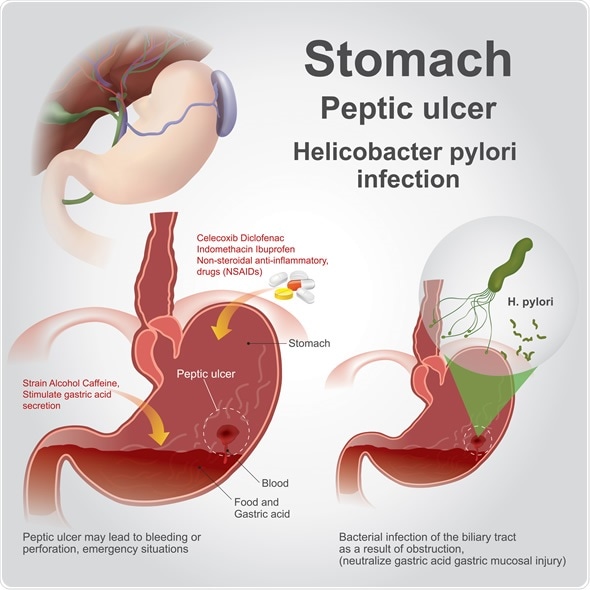For The Latest Medical News, Health News, Research News, COVID-19 News, Pharma News, Glaucoma News, Diabetes News, Herb News, Phytochemical News, Thailand Cannabis News, Cancer News, Doctor News, Thailand Hospital News, Oral Cancer News, Thailand Doctors
For individuals who have been diagnosed with peptic ulcer disease, there are often several lifestyle changes that go alongside the treatment plan provided by the medical practitioner. Over time, a peptic ulcer typically heals with adequate treatment, though affected individuals need to pay attention to their diet in the future to prevent the formation of another ulcer.
There are some strategies that can help reduce the risk of a peptic ulcer occurring, which are particularly useful for individuals with peptic ulcer disease who are susceptible to ulcers. These are discussed in more detail below.

Traditional dietary advice for people with peptic ulcer disease included a bland diet and avoidance of spicy, fatty, and acidic foods. However, this diet has not been proven to help in the treatment or prevention of peptic ulcers. Therefore, the diet should be advised on a case-by-case basis, according to what works best for the individual.
Dietary and that may be recommended include:
Some trigger foods cause irritation and increase the production of acid in the stomach, thus increasing the risk of heartburn symptoms. It can be helpful for individuals with peptic ulcer disease to keep a food diary and record symptoms to keep track of potential triggers that they can reduce in their diet.
It is important for individuals to focus on eating a healthy diet with sufficient intake of fresh fruits and vegetables, as well as whole grains. Increased consumption of foods with probiotics, such as yogurt, aged cheeses, miso, and sauerkraut may also be beneficial.
There are also some lifestyle modifications that are important for people with peptic ulcer disease to prevent the worsening or recurrence of ulcers.
Firstly, individuals who smoke are recommended to stop smoking, as it increases the risk of ulcer formation. People with peptic ulcer disease who smoke may require support and encouragement from their family, friends, and health practitioners to strengthen their will to quit. There are also aids available to help individuals to stop smoking.
Additionally, stress may also be linked to the formation or worsening of ulcers and, therefore, avoidance of activities known to cause stress to the individual may be useful. Implementing strategies to increase relaxation can also help.
The most common cause of peptic ulcers is an infection with Helicobacter pylori (H. pylori) bacteria. Although the exact method of transmission is not known, some research has suggested that the infection may spread between people through food and water.
To prevent ulcer associated with H. pylori infection, it is recommended for individuals to wash their hands well and frequently, particularly when eating or preparing meals. Additionally, all foods should be adequately cooked.
Some medications are known to increase the risk of peptic ulcer formation. In particular, non-steroidal, anti-inflammatory medications such as aspirin or ibuprofen are known to exhibit this effect in some individuals. If these medications are required, other medications to reduce the risk of ulcer formation may be prescribed.